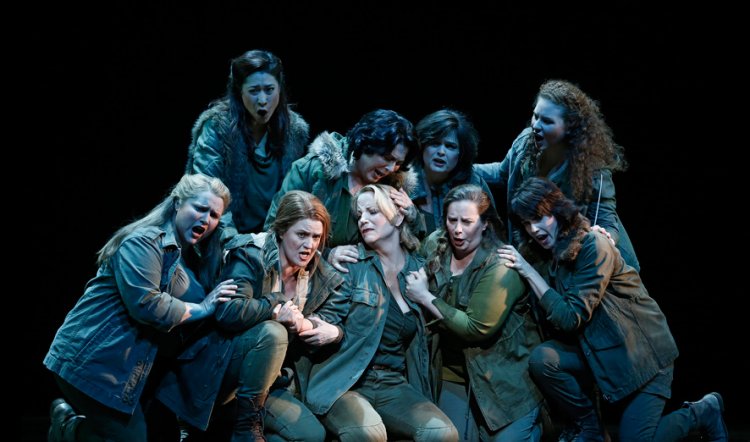
DER RING DES NIBELUNGEN
DER RING DES NIBELUNGEN – The Ring, Opera Australia at the Arts Centre, Melbourne, 21 November-16 December 2016. Photography: above L-R – Anna-Louise Cole, Hyeseoung Kwon, Dominica Matthews, Roxane Hislop, Lise Lindstrom, Nicole Youl, Amanda Atlas, Olivia Cranwell and Sian Pendry; below - Lise Lindstrom and Stefan Vinke; below again - the swings
After the prequel (see Das Rheingold here) the second night – DIE WALKÜRE – is where The Ring really starts rolling. And this production is no exception as are introduced, motif by motif, fifteen thrilling solo singers. The first of these are seen through a snow storm over a rude peasant’s hut. It’s where Hunding lives with his wife Siegelinde and she (Amber Wagner, a stupendously gifted American soprano) is home alone when a half frozen stranger stumbles to the door. Siegmund (Bradley Daley) is her twin and as much of a Ranga as she. They sing for quite a while and the music is so sublime they fall in love.
Love and loss are the keys to Die Walküre: parental, maternal, marital, innocence – all are experienced and either lost or wilfully discarded. These mythical Gods and their stories are the essence of humanity.
Perhaps that’s the point of the spiral stairway which is the centrepiece for the next act (set design Robert Cousins, lighting – that often saves the day – Damien Cooper). It was possibly inspired by either a down-market cruise liner or municipal car park although, suspended from above and filling its central void is an awful lot of taxidermy. Some of these stuffed animals featured prominently in Das Rheingold – in glass cases reminiscent of the late Victorian era of home decor and nowadays by such deplorables as Robert Borsak of the Shooters & Fishers Party.
According to available reading material (excellent program-booklet: $40), the taxidermy apparently represents the destruction of the natural world and extinction of species. However, as one prominent critter is a common or garden Zebra while the Thylacine has already gone on long ago, they are more of a distraction than potent symbolism. That is the problem with cock-eyed design: if it distracts from the drama and the singing, it’s a failure. There are many such distractions in this Ring.
The costumes (Alice Babidge) are similarly diverting. Given that the glitzy Rhine Maiden showgirls (Das Rheingold) seem to belong in Las Vegas, it’s puzzling to see Sieglinde and Siegmund tramping about in Ceaucescu Romanian peasant gear. Then, when Fricka (Jacqui Dark) arrives on the spiral stairway to give hubby Wotan a piece of her mind, she sings like a fallen angel while dressed as if for a 1950s cocktail party in a taupe frock with a dead fox on her shoulder. Distraction doesn’t come into it.
Back to the music, however, and what everyone is waiting for in Die Walküre – The Valkyrie –is the arrival of Siegmund’s other sister, Brünnhilde. It is one of the most aurally spectacular moments in western music and American soprano Lise Lindstrom lived up to all hopes. Tall, blonde and athletic, Lindstrom is every moment a warrior woman with a voice to match: strong, true and richly coloured, her Brünnhilde is also beautifully acted so that when she and her father meet and the inevitability of her fate becomes obvious, it is a truly moving scene.
Before that, however, she unites with her sister Valkyries in their fabled war cry and even manages to overcome the ridiculousness of her warhorse Grane being represented by yet another stuffed beast. It has to be said, though, that it’s only because these “choosers of the slain” – Anna-Louise Cole, Hyeseoung Kwon, Dominica Matthews, Roxane Hislop, Nicole Youl, Amanda Atlas, Olivia Cranwell and Sian Pendry – are such superb singers that they somehow overcome the utter ridiculousness of their triumphal “ride” onto the stage on swings that are so short of thrill or magnificence as to be incomprehensible. Like the lumpen device of the cherrypickers in Das Rheingold that robbed the scene of all menace, the swings not only do not swing (think Matilda for how to do it properly) but also, lower the warriors so slowly and awkwardly, the effect is risible rather than stirring.
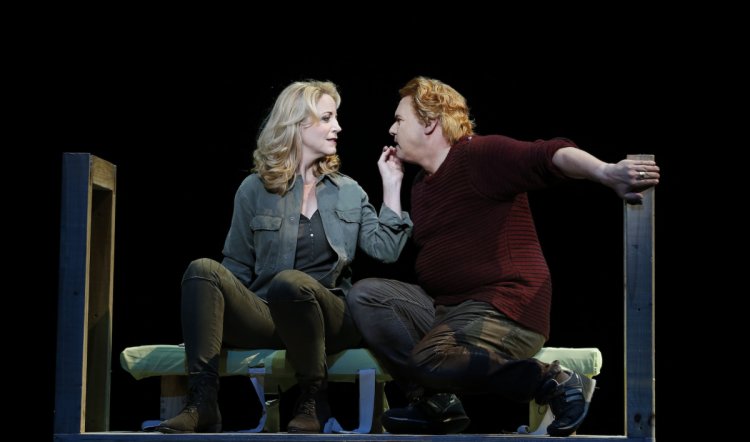
The same has to be said of what should be the climactic end of the piece when Brünnhilde is condemned by Wotan to sleep on her rock within a ring of fire until woken by a lover who knows no fear. While the magnificent music and singing is ripping the hearts out of the audience, our heroine lies on the stage only to be surrounded by an economy version of grandeur – reminiscent of a gas ring from BBQs Galore. What?
The third element of DER RING DES NIBELUNGEN is Siegfried and it ramps up the drama and spectacle even more, which is a remarkable achievement after the turmoil and tragedy of Die Walküre. Nevertheless, this production seems to try its hardest to undercut that drama and spectacle at every turn. It is as if the creative team wants to reduce it to the everyday and the unremarkable, to underline the power of the ordinary to trash the extraordinary. It’s perverse. But it reckons without the intervention of yet another stupendous voice and performance in the form of Stefan Vinke as Siegfried.
Before he can grab the piece and rescue it, however, Siegfried is forced to endure an opening scene where he sits on a kid’s bunk bed and behaves even more brattishly than is normally required as his poor old guardian Mime (Graeme Macfarlane) goes about domestic life and attempts to look serious while fashioning an essential bit of equipment in a furnace that might have been in the pizza oven section of BBQs Galore (see above).
But Lo! a Wanderer this way comes and it is Wotan in disguise. James Johnson has more to do in this piece and he does it better, not least because it suits his voice, but also because he has a wider range of emotion to explore. He is a dark and sad presence and a sharp contrast to his Nemesis, the spiky, sinister Alberich (Warwick Fyfe – another fabulous performance). The journey Wotan takes towards handing over power to Siegfried is a fascinating one, because who – particularly among the Gods – is ever willing to relinquish power?
The absolute power here, of course, resides in the ring and the gold, secreted in a cave and guarded by a dragon. Who can slay the beast and retrieve the treasure? And what about the curse? If at this point you’re wondering whether Richard Wagner was on something when he wrote The Ring, the answer is: much speculation about laudanum, opium and champagne exists.
There are probably as many ways to stage the entry to the cave and the killing of the dragon as there are members of the orchestra; how bloody-minded then to represent the cave as a small black hole, have our hero reach in with a sword to stab the unseen creature and, in return, rather than a gush of dragonly blood, out of the cave springs a few red party popper streamers. Again, the determination to undercut anything mythical, marvellous or malevolent is breathtaking.
On the other hand, it’s no more inexplicable than the opening sequence with Fafner (Jud Arthur) sitting at his mirror as a tired old actor, crudely applying clown make-up – whiteface, black holes for eyes, twisted red mouth – all reflected in huge form via a camera onto a screen. He is weary and scarcely able to contort his features into a snarl, let alone frighten off a would-be thief. It is weirdly mesmerising, though...
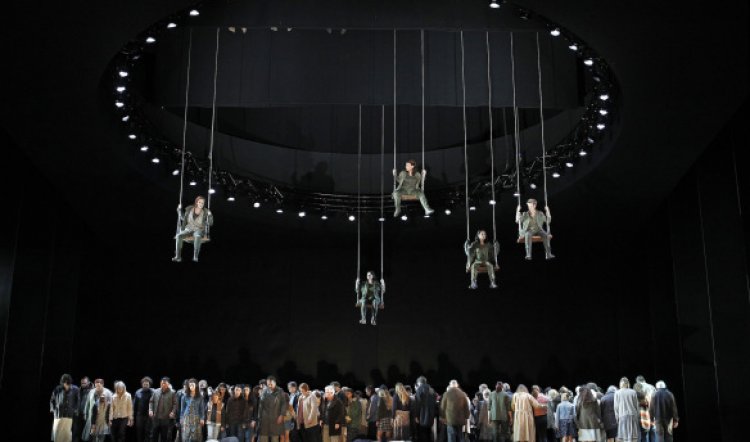
Also mesmerising when it occurs, some hours into the saga, is Siegfried’s discovery of the sleeping Brünnhilde. He has to deal with some plastic wrapping that encloses her before being able to fully appreciate what an incredible find he’s made. And, of course, the audience already knows this Brünnhilde is the most ravishing creature imaginable. So when the duo begins to sing of this amazingness and how crazy they are for each other, the music and their performances rise to yet another level of magic. It’s an exhilarating way to end several hours in a theatre.
But wait! There’s more! Wagner’s Ring is the gift that keeps on giving, and Götterdämmerung could just be the greatest gift of all. As Ring-nuts know and are quick to point out, seeing each or any of the four elements separately is just not the same as experiencing the full week of The Ring. It’s a journey for performers and audience alike, although rather more strenuous for the former, but it’s inexorably gripping and unique.
Götterdämmerung is, at around six hours, the longest element of The Ring but such is the absorption with the characters, the music and the crazy, crazy story, it barely seems enough. By this time, all have either climbed or fallen off the mountain of power and love and the result is a distillation of all emotions and motives into love or hate. Offered a toxic brew by the conniving Hagen (Daniel Sumegi) Siegfried instantly forgets his love for Brünnhilde and instead does a Trump on Gutrune (Taryn Fiebig). It’s a particularly disturbing turn of events in this year at this time as sex and male power go into overdrive with the ring – the golden symbol of the object of desire – wrestled over and women treated with complete disdain. Shudder.
It’s made more disturbing by yet another peculiar setting: a white canvas and clear plastic function marquee of the kind that these days mars the north front of the Sydney Opera House. And just like that one, it seems to signify the triumph of bad taste and commerce over aesthetics. It’s the perfect venue for the ill-fated double wedding that isn’t and the peculiar dance routine that at least gives the chorus and extras something to do; and when it finally catches fire, there’s a definite sense of poetic justice, and it does look quite dramatic for a minute.
As has already been said, however, it’s the singers, the orchestra and the music (under brilliant conductor Pietari Inkinen) that makes The Ring and this one is blessed with the finest. Throughout the final element the singers soar over the grand orchestra, Stefan Vinke underlines his position as one of the world’s best, while Lise Lindstrom’s first complete Ring has to be a career-changing triumph for her; and Amber Wagner also shines brighter than bright.
Our home-grown talent isn’t to be sneezed at either: Warwick Fyfe, Jacqui Dark, Daniel Sumegi, Taryn Fiebig, Lorina Gore, Anna-Louise Cole, Jud Arthur, Hyeseoung Kwon, Jane Ede, Dominica Matthews, Roxane Hislop, Nicole Youl, Amanda Atlas, Olivia Cranwell and Sian Pendry all make splendid contributions.
It’s a phenomenal achievement and leaving the theatre for the last time after a tumultuous week is a strange mixture of exhilaration and melancholy. Amazing.

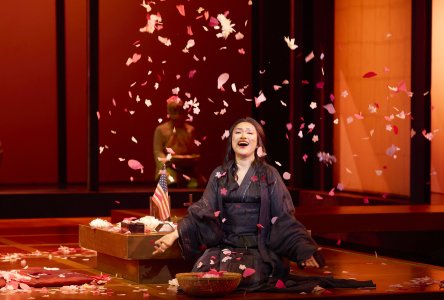
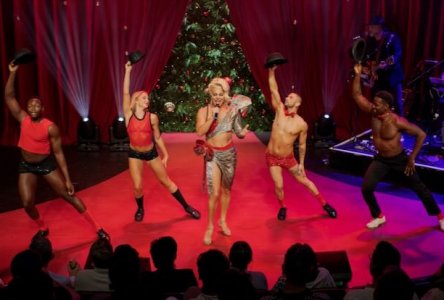
-c444x300.jpeg)